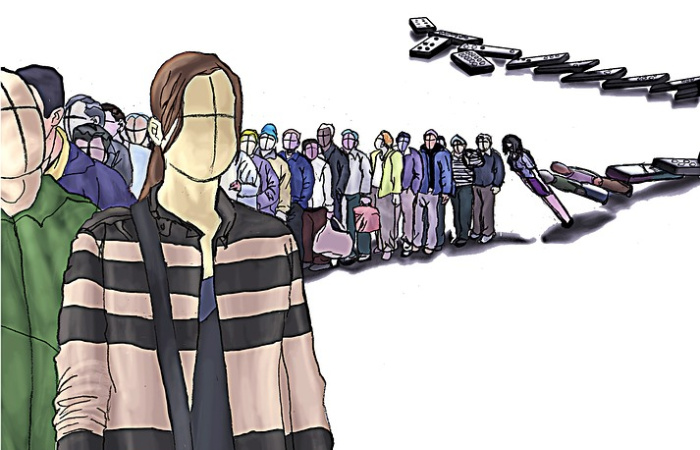A photo shared on social media showing a long line of Chinese nationals waiting to get their identification photos at a mall in Quezon City is reviving concerns about the influx of Chinese citizens in the country.
Facebook user Philip Lustre Jr. said that one of his friends gave him the photo and asked him if the Philippines is now a “province of China.”
“A netizen sent me this photograph and couldn’t help but ask if ours has become a province of China,” Lustre said in the caption.
Lustre did not name the friend or follower who gave him the photo. It also could not be verified if those in the photo are Chinese nationals.
The “province of China” phrase came from the tarpaulin banners displayed on several footbridges around Metro Manila bearing the slogan: “Welcome to the province of China!”
These sightings coincided with the second anniversary of the arbitration award that recognizes the Philippines’ rights over the West Philippine Sea and invalidated China’s “nine-dash line” claim.
This was not the first time that foreigners caused inconvenience in a public space.
In November 2018, there were two instances when the unruly behavior of a group of supposed Chinese men and a Chinese tourist drew the ire of locals online.
Last January, a photo of a female tourist who allowed her toddler to defecate at the Mall of Asia Seaside also made rounds on social media.
Chinese influx
From 2016 to 2018, a total of 3.12 million Chinese citizens arrived in the country, data from the Bureau of Immigration showed.
Of these, there are 2.44 million from mainland China, while the rest came from Hong Kong, Macau and Taiwan.
There has also been a sharp increase in temporary working permits granted to Chinese nationals since 2016 attributed to the government’s support for online gaming establishments run mostly by Chinese nationals.
An undetermined number of illegal Chinese workers in unauthorized gaming companies have been looked into at congressional inquiries.
The Senate labor committee found over 119,000 tourists, mostly Chinese, were able to pass Philippine labor regulations in 2018. They initially entered the country using tourist visas and soon stayed to work for online gaming firms.
A writer from Forbes magazine observed that such phenomenon is an effect of President Rodrigo Duterte’s appeasement policy toward China despite its aggressive militarization in the West Philippine Sea.
“The Philippines isn’t open just to Chinese workers. It is also open to Chinese contractors, real estate developers, gamblers, etc,” economist Panos Mourdoukoutas wrote.
“And as Chinese gamblers come to the Philippines, so do related businesses, like restaurants and entertainment staffed by Chinese workers,” he added.

